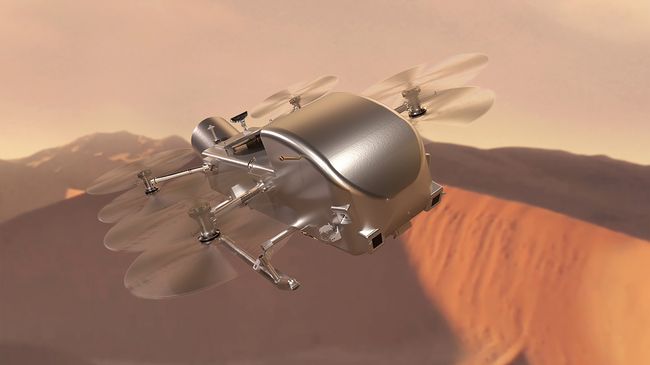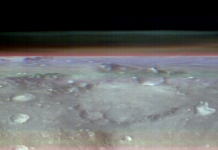Titan exploration tentatively pushed back to 2028
NASA’s Dragonfly mission, aimed at exploring Saturn’s moon Titan, will be delayed: the next stage of development has been postponed by a year, and the launch is scheduled for July 2028. The official reason for the delay was budget uncertainty, which delayed official confirmation and determination of the cost and schedule of the Dragonfly mission.
The Dragonfly team will continue to work on the next phase of development, Phase C, which will develop a rotary unmanned vehicle the size of a car. This vehicle will fly over Titan’s dunes and will be able to land to study Titan’s abundance of organic molecules.

On November 28, at a meeting of NASA’s External Planetary Assessment Group (OPAG), Laurie Glaze, director of the agency’s planetary science division, announced the reasons for the delay in the launch, which was originally scheduled to take place in 2027. Funding and budget uncertainties for 2024 and 2025 were the main reason for the delay in official confirmation of the Dragonfly mission. Glaze also noted that the Dragonfly mission design will be presented again to the program management council (APMC) in the spring of 2024, following the preliminary readiness of the fiscal year 2025 budget proposal at NASA.
Dragonfly mission to Titan: launch delayed by a year due to budget uncertainty
The Dragonfly team will replan the mission, and once all necessary changes are completed and verified, NASA will assess the mission’s readiness for launch in mid-2024. As a result, some elements of the Dragonfly mission will be delayed while other aspects continue to be developed.
Dragonfly is the only NASA mission planned to explore the surface of Titan. When the device arrives on Titan, it will look for signs indicating the possibility of life. Dragonfly will also study how advanced prebiotic chemistry is on Saturn’s moon, and even look for signs of water or hydrocarbon-based molecules.
In addition to traveling further on Titan than any other alien rover on its missions, Dragonfly will also land on Saturn’s surface in different regions, collecting samples to determine the composition of surface materials in different regions.
Studying Titan is a high priority for planetary scientists because it is the only moon in the solar system known for its thick atmosphere and hydrological cycle similar to Earth’s. It is also an oceanic world with clouds of methane, rain, and liquid on the surface that forms lakes and seas. The discovery of oceans and the potential presence of organic matter frozen in Titan’s ice increases the potential for viability on this moon.
The Dragonfly mission is being developed and will be managed by the Johns Hopkins Applied Physics Laboratory (APL) in Maryland. To carry out the research on board the device, cameras, sensors and sample collection tools will be used.
“Dragonfly is a fearless engineering concept that is one of a kind. I am inspired by how our team has repeatedly overcome obstacles by working together and thinking outside the box,” said Dragonfly Principal Investigator Elizabeth Turtle.
Several Dragonfly components, including control and navigation systems, have already been tested over California deserts chosen for their similarity to the dunes on Titan – as well as in wind tunnels at NASA’s Langley Science Center. The full-scale model was also tested in the Titan Simulation Chamber at the Johns Hopkins Applied Physics Laboratory—which recreates the cold temperatures and atmospheric pressures similar to Titan’s methane environment.
For now, the Dragonfly mission remains the only NASA mission planned to study the surface of Titan. It represents an important step in exploring the potential viability and organic chemistry of other planets and moons in the solar system.
“Team Dragonfly has demonstrated readiness for the next phase of our journey to conquer Titan. We are relentlessly moving forward without losing the curiosity and creativity that are key to the success of the Dragonfly mission,” said Turtle.




